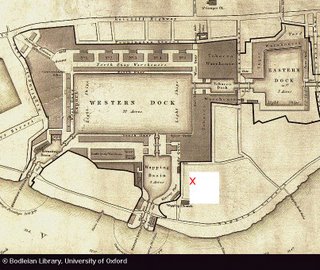With the information provided by Charles Booth study I was able to re-revaluate my research from twenty years ago, looking back at the 1841, 1851, 1861, 1871 and 1881 census return details that I had so diligently noted on visits to London in 1986 and 1987. I was also able to use the 1891 census that had become available in the intervening years.
Now obviously it can be dangerous drawing too many conclusions abou addresses, locations etc from such a long distance in time but the East End hasn't really changed that dramatically in social terms over that period. Yes there are wealthy developments but those are in areas where the local population had dwindled considerably in the sixties and after as the docks closed.
Looking around Wapping last summer it struck me how so little has changed in terms of housing, where there were slums there are now social housing projects and housing assoications, these are still for the benefit of those at the lower end of the housing/job market. Of course poverty ism't as bad but Booth could come back tomorrow and I don't think the colours on his map would vary a great deal.
What is obvious from looking at the census details, together with contemporary records and histories is that my Grandmother's family started off well having moved across the river from Southwark to Whitechapel but that their fortunes changed with those of London Docks. My 3x Grandfather, his Son and his Grandson (my Grandfather) were all Carmen, as were all the boys in each of the three generations. A Carman was the 19th century equivalent of a man with a van, except these were men with a horse and cart who moved the goods around and outside of the docks.
The London Docks suffered from the competition of the East and West India Docks, this was because the latter were used by the shipping companies from which they took their names who in turn used ships too big to sail as far upstream as the London Docks. There were also changes in employment practices which would eventually result in the 1889 dock workers strike and the new piece-work system.
From the addressess in the return it's possible to follow the family from living in what could be classed as fairly reasonable accommodation from 1841 to 1871 followed by the best part of thirty years decline. As I've said previously an act in 1875 meant that my family were evicted as part of a slum clearance, no compensation was payable to them as tenants - looking through my notes from a visit to the Greater London Record Office in 1987 I made the point that all the three storey houses had frontages of less than 10 feet, fairly common for the time but small by modern standards. They then moved between 1881 and 1891 to another slum, which was soon condemned before ending up in White Thorn Place. When White Thorn Place was eventually demolished they were re-housed, thsi was because the London County Council had replaced the old Metropolitan Board of Works in 1888 and obviously felt some moral obligation.
They may well have been financial compensation as well because the house my great grandfather was re-housed in survived up until the blitz and was only replaced by a block of typical postwar flats. My great grandfather continued to work in the docks until 1951, he died aged 76 having outlived his wife and four of his eight children, although three of those died before reaching their teenage years. Working sixteen hours a day in the docks he earned enough to put one of his daughters through secretarial colleage and another, my grandmother, into nursing. Of the two other children who survived into adulthood one opened a chain of greengrocers and the other married a local dockworker and eventually moved out to Dagenham in Essex.
I know I should end with some sort of summing up, some form of conclusion but all I have is admiration from my Great Grandfather who took advantage of a dreadful situation and turned it to this, and ultimately mine, advantage.
The map below is an 1831 map of the London Docks, I have put a red cross approximately where my ancestors lived and where there house was knocked down for slum clearance - the close proximity of the docks is very obvious!

2 comments:
Thanks for all that Paul. I haven't really go anything to add but I do enjoy reading about the research of others and what they have managed to ascertain. You've worked hard on yours.
BTW, I don't know if this is relevant to you or not but I have extended my ancestry subscription to worldwide including the US. If you need a look up just ask!
Thanks Mags.
You are right about putting flesh on the bones, I think a lot of people see family history as some sort of competitive sport - how far back have you gone etc and miss the chance to explore the suuroundings their ancestors lived in.
I have to say my appreciation of records other than civil registration and parish records came about by accident and I will post about that later in the year.
The good thing about reading other people's research for me is that it sparks off ideas, little nuggets of information that lead you down unexpected paths.
Post a Comment